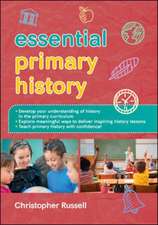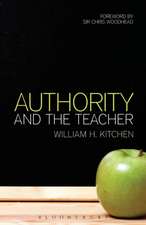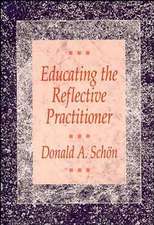John Dewey: Bloomsbury Library of Educational Thought
Autor Professor Richard Pring Professor Richard Baileyen Limba Engleză Paperback – 22 oct 2014
Din seria Bloomsbury Library of Educational Thought
- 13%
 Preț: 251.83 lei
Preț: 251.83 lei - 22%
 Preț: 250.45 lei
Preț: 250.45 lei - 13%
 Preț: 250.55 lei
Preț: 250.55 lei - 13%
 Preț: 251.39 lei
Preț: 251.39 lei - 13%
 Preț: 251.57 lei
Preț: 251.57 lei - 13%
 Preț: 250.45 lei
Preț: 250.45 lei - 13%
 Preț: 251.83 lei
Preț: 251.83 lei - 13%
 Preț: 250.45 lei
Preț: 250.45 lei - 13%
 Preț: 256.12 lei
Preț: 256.12 lei - 13%
 Preț: 250.01 lei
Preț: 250.01 lei - 13%
 Preț: 251.39 lei
Preț: 251.39 lei - 13%
 Preț: 253.75 lei
Preț: 253.75 lei - 13%
 Preț: 251.83 lei
Preț: 251.83 lei - 13%
 Preț: 257.50 lei
Preț: 257.50 lei - 13%
 Preț: 257.97 lei
Preț: 257.97 lei - 13%
 Preț: 250.45 lei
Preț: 250.45 lei - 13%
 Preț: 252.42 lei
Preț: 252.42 lei -
 Preț: 300.62 lei
Preț: 300.62 lei -
 Preț: 251.51 lei
Preț: 251.51 lei -
 Preț: 238.53 lei
Preț: 238.53 lei -
 Preț: 272.29 lei
Preț: 272.29 lei -
 Preț: 274.53 lei
Preț: 274.53 lei - 22%
 Preț: 225.49 lei
Preț: 225.49 lei -
 Preț: 273.86 lei
Preț: 273.86 lei
Preț: 256.12 lei
Preț vechi: 294.67 lei
-13% Nou
Puncte Express: 384
Preț estimativ în valută:
49.02€ • 50.63$ • 40.79£
49.02€ • 50.63$ • 40.79£
Carte tipărită la comandă
Livrare economică 25 martie-08 aprilie
Preluare comenzi: 021 569.72.76
Specificații
ISBN-13: 9781472518774
ISBN-10: 1472518772
Pagini: 208
Dimensiuni: 156 x 234 x 13 mm
Greutate: 0.3 kg
Editura: Bloomsbury Publishing
Colecția Bloomsbury Academic
Seria Bloomsbury Library of Educational Thought
Locul publicării:London, United Kingdom
ISBN-10: 1472518772
Pagini: 208
Dimensiuni: 156 x 234 x 13 mm
Greutate: 0.3 kg
Editura: Bloomsbury Publishing
Colecția Bloomsbury Academic
Seria Bloomsbury Library of Educational Thought
Locul publicării:London, United Kingdom
Caracteristici
Provides
both
a
useful
overview
and
synthesis
of
Dewey's
philosophy
in
relation
to
education
in
one
volume,
saving
students
valuable
research
time
Notă biografică
Richard
Pringretired
from
being
the
first
Professor
of
Educational
Studies,
and
Director
of
the
Department,
at
the
University
of
Oxford,
UK,
in
2003
after
14
years.
After
retirement
he
was
Lead
Director
of
the
£1
million
Nuffield
Foundation
review,
whose
reportEducation
for
All:
the
future
of
education
and
training
for
14-19
year
oldswas
published
in
2009.
His
most
recent
book,Life
and
Death
of
Secondary
Education
for
All,
has
followed
up
the
review.
Cuprins
Series
Editor's
PrefaceForewordIntroduction:
Genesis
and
Nature
of
the
BookPart
I:
Intellectual
Biography1.
Dewey:
The
Man,
his
Life,
his
Writings
and
his
BequestPart
II:
Critical
Exposition
of
Dewey's
Work2.
Educational
Aims3.
Experiencing,
Making
Sense,
Knowing
and
Inquiring4.
Child-centred
Education5.
Curriculum:
Logical
and
Psychological
Aspects6.
Community
and
the
Individual:
Democracy
and
EthicsPart
III:
Philosophical
Underpinnings7.
Pragmatism:
Meaning,
Truth
and
ValuePart
IV:
A
Philosopher
of
Education
for
our
Time?8.
Current
Problems
and
Dewey's
'Would-be
Response'BibliographyIndex
Recenzii
Its
greatest
success
is
in
bringing
the
lens
of
Dewey's
philosophy
to
current
educational
problems.
Through
Pring's
studied
lens
we
see
two
images
clearly:
the
piteous
one
a
society
that
neither
respects
nor
even
particularly
likes
children
and
a
hopeful
one
of
a
pair
of
educational
philosophers,
Pring
and
Dewey,
who
do.
It is difficult to underestimate the importance of this book. Professor Pring has illuminated the character and complex structure of John Dewey's thought within a clear, sophisticated and comprehensive framework of analysis. Pring's sympathy with Dewey's different accounts, especially on the nature of inquiry and what Dewey meant by interests, gives teachers and students access to a thinker whose work sometimes seems impenetrable. Pring's great advantage here is that he writes from a different tradition, giving the book exceptional balance. The description of how Dewey might assess 21st century education should give every politician, administrator and parent reason to pause and reflect on how the education ideal has been corrupted. This book is therefore of immense value for any student who needs to, indeed should, master the work of one of the most penetrating and imaginative educators and philosophers of modern times.
It is difficult to underestimate the importance of this book. Professor Pring has illuminated the character and complex structure of John Dewey's thought within a clear, sophisticated and comprehensive framework of analysis. Pring's sympathy with Dewey's different accounts, especially on the nature of inquiry and what Dewey meant by interests, gives teachers and students access to a thinker whose work sometimes seems impenetrable. Pring's great advantage here is that he writes from a different tradition, giving the book exceptional balance. The description of how Dewey might assess 21st century education should give every politician, administrator and parent reason to pause and reflect on how the education ideal has been corrupted. This book is therefore of immense value for any student who needs to, indeed should, master the work of one of the most penetrating and imaginative educators and philosophers of modern times.











